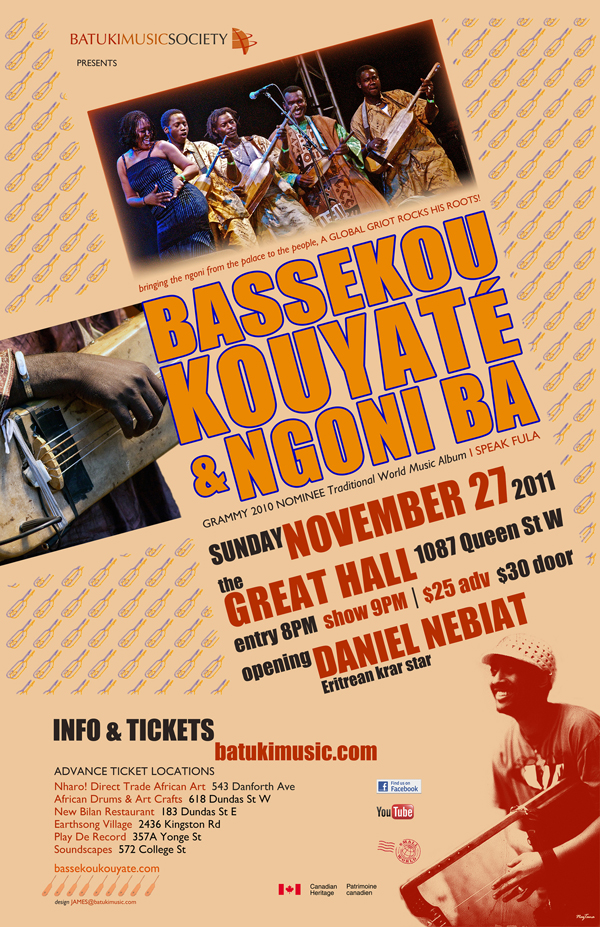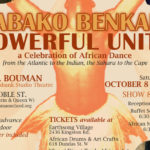Bassekou Kouyaté & Ngoni Ba: Nov 27, 2011
Batuki Music Society presents
BASSEKOU KOUYATÉ & NGONI BA
Mali’s Bassekou Kouyaté & Ngoni Ba have deep roots in the griot tradition. The ngoni drives the band’s energetic live performances. When four of them are joined by the calabash, percussion and vocalist Amy Sacko’s transcendent voice, the pulsing, hypnotic sound compels audiences to dance.
opening: DANIEL NEBIAT
| Sunday, November 27, 2011The Great Hall 1087 Queen Street West, Toronto Doors at 8 PM / Showtime 9 PM Ticket: $25 advance / $30 at the door |
tickets on sale now at these locations: Nharo! Direct Trade African Art 543 Danforth Ave. African Drums & Art Crafts 618 Dundas St West New Bilan Restaurant 183 Dundas St. East Earthsong Village 2436 Kingston Rd. Play De Record 357 Yonge St. Soundscapes 572 College St.and ONLINE… |
The Djeli/Griot’s Ngoni 101
bio-documentary made for Segu Blue, 2007 (two parts)
Out Here Records
Bassekou Kouyaté is a virtuoso picker and musical visionary whose work blurs the lines between West African and American roots music. The ngoni, his instrument, is a ‘spike lute’ and an ancestor of the banjo, sharing its taut-skinned drum body, percussive attack, and varied picking techniques.
Bassekou is a true master of the ngoni and he has collaborated with many musicians in and outside of Mali. He was part of Taj Mahal and Toumani Diabaté’s Kulanjan project, as well as being one of the key musicians on Ali Farka Toure’s posthumous album Savane (2006). He also toured and recorded with Bela Fleck on the Grammy winner ‘Throw Down Your Heart’.
an interview with Banning Eyre on Afropop Worldwide
Bassekou was born in a village called Garana, 40 miles from Segu in the remote countryside on the banks of the Niger River. He was raised in a traditional music environment, his mother a praise singer and his father and brothers exceptional ngoni players. Bassekou moved to Bamako when he was 19 years old where he met the young Toumani Diabaté. By the late 1980’s Bassekou was part of Toumani’s trio and they recorded their first albums together, ‘Songhai’ and ‘Djelika’. Bassekou married the singer Ami Sacko, the ‘Tina Turner of Mali’, and they have been in high demand for the traditional Sunday wedding parties in the streets of Bamako.
In 2005, Bassekou formed Ngoni Ba, the first-ever group built around not one but four ngonis of different sizes, all played by members of his family. Its repertoire is from the region of Segu, the heart of Bambara culture. Unlike Mandinka griot music, Bambara music is pentatonic in nature, music as close to the blues as you can get in Africa.
Bringing the ngoni from the palace to the people, a global griot rocks his roots!
Segu Blue, his debut as a band leader, won the 2007 BBC Radio 3 Award for World Music as Best Album. It was followed in 2009 with I Speak Fula – 11 tracks providing a star-studded tour of pan-Malian music, including contributions from Toumani Diabaté, griot vocal legend Kasse Mady Diabaté, master of the horse-hair soku fiddle Zoumana Tereta, and guitar phenomenon Vieux Farke Toure, Ali’s talented son. I Speak Fula was nominated for the 2010 Grammy for Best Traditional World Music Album, ironically won by a Ali Farka Toure & Toumani Diabaté collaboration).
The opening act is Eritrean-Canadian Daniel Nebiat, who sings and plays the krar – a traditional stringed instrument similar to the harp, tuned to a pentatonic scale and in Daniel’s case, amplified. His music combines both traditional and modern forms of Eritrean music.
Batuki Music Society gratefully acknowledges the support of Canadian Heritage
and the promotional assistance of Small World Music.
Occupy Bamako: a musical revolution – standing up for the ngoni
To answer the pressing question on everyone’s mind, this story told by the picture…
The “Buffet de la Gare” (Buffet Bar of the Station Hotel), the club in the legendary train station of Bamako, was Mali’s celebrated night-spot for music throughout the 60s, 70s and 80s. A young (not yet 20) Bassekou Kouyaté was playing with members of the famous Rail Band backing the singer Nainy Diabaté, in 1985.
In those days, ngoni players played their instrument sitting down, not standing up like the guitarists who fronted Mali’s dance bands. This evening, Bassekou had decided it was time to change that: the ngoni had to be seen and not just heard. During the show, he suddenly stood up and walked up to the front of the stage. For the first time, a ngoni player had strapped his instrument over his shoulder like an electric guitar and was playing a solo standing up.
Kouyaté can pinpoint the decisive moment when he started to move along a distinct artistic path: “Nainy Diabaté… was looking for a new sound, and I was looking for a new way to play ngoni. The old guys always sat down when they played, but when rock guitarists soloed, they went to the front of the stage. I decided to put a strap on the ngoni, so when it was time for my solo, I moved to the centre and surprised everyone.”
The audience was stunned. Traditionalists even started a debate after the concert about whether this teenager was allowed to change the style of playing ngoni. What was new then has long become common practice in Mali today.
With this performance, Kouyaté had not only established himself as a major innovative force in Malian music, but also intentionally brought the ngoni into the spotlight. “This is why I have struggled to create Ngoni Ba,” he says, “to put this instrument on the international stage. We don’t have to stay in back. That’s impossible.”
Since the 1980s, Kouyaté has continued to find new ways to play his instrument, creating a double picking technique as well as sliding and bending notes like no one before. Today, these developments have become standard practice for aspiring ngoni players.
Bassekou Kouyaté & Ngoni Ba
Sunday, November 27, 2011 at The Great Hall
source cited: liner notes and press release, ‘I Speak Fula’ rockpaperscissors.biz


